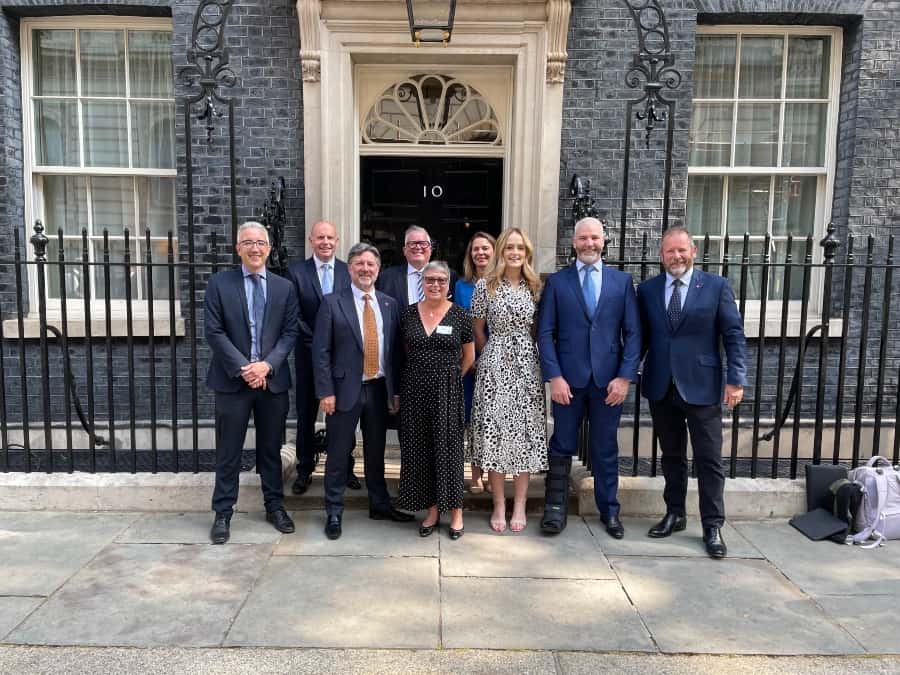Solopress’ Managing Director, Simon Cooper, visited 10 Downing Street on the 22nd of June with the Independent Print Industries Association (IPIA) to advocate the vast potential of our industry and the promising future print could have with the support of our government.
IPIA: A Champion for the Print Industry
The IPIA was founded in 1990 as a not-for-profit trade association committed to the growth and development of the print industry.
It comprises over 400 members including printers, print managers, service providers, and equipment manufacturers, and has been an influential advocate for the industry.
They collaborate with a host of other leading trade organisations to promote the industry, raise awareness, and support the future of print.
The IPIA’s ultimate goal is to foster a stronger, larger print industry, using its influence to highlight the industry’s vast potential and the promising future it could have with government support.
UK Print Industry: A Manufacturing Success Story
The UK print industry, with a history dating back to the granting of a Royal Charter to the Stationers Guild in 1557, has grown to consist of more than 4,000 businesses.
The UK is a leading developer and exporter of security print-related products, a global innovator in ink manufacturing, and home to major global print technology brands.
The print industry directly contributes £14 billion each year to the economy, employs 112,000 skilled workers across 8,000+ businesses, and generates £3 billion in wage contributions.
In comparison to other sectors, the UK’s print industry has managed to maintain its position as a global player, with the UK currently ranking as the 6th largest producer of printed products in the world.
The Need for Government Engagement
Despite its importance, the government’s engagement with the print industry has dwindled significantly over the last few decades.
Now, countries like the USA, China, Japan, Germany, and India, which have incorporated the print industry in their manufacturing growth strategies, outperform the UK in the global print market.
However, the industry still holds immense potential in the UK with the right support and investment from the government. During their visit to Downing Street, the IPIA delegation, including Solopress’ Simon Cooper, was able to highlight the many ways that government support could help the industry stay competitive and reverse its recent downturn.
Inclusion in initiatives like the Energy Intensive Industries utilities support scheme, provision of increased capital allowances on industry-specific investment, special classification for exports, and subsidies to reduce costs could significantly help the industry thrive.
Furthermore, recognising the print and paper industry as an ‘industry of strategic value’ can pave the way for inclusion in various manufacturing stimulus and support schemes.
Advocating for a Sustainable Print Industry
The UK print industry has made significant strides in sustainability, leading the charge towards the government’s ambitions of net zero.
It uses high sustainability index materials, develops recycling and remanufacturing initiatives, and supports global sustainability standards.
As the country evolves its place in the global economy post-Brexit, the print and paper industry, with the right support, can continue to thrive as a British manufacturing success story.
This aligns with the recent news that the UK has joined the Trans-Pacific Partnership (CPTPP) trading bloc, making it a crucial time to assist and help UK print and paper increase exports.
The integral role of the print industry
The industry also remains crucial for the functioning of various sectors, including manufacturing, retail, education, and pharmaceuticals.
Furthermore, our industry contributes to the country’s democracy by providing a platform for citizens to express their political preferences through printed voting ballots.
Addressing the need for a young workforce
One aim of the meeting at 10 Downing Street was to encourage the promotion of our industry so young talent can continue to be attracted into the sector.
Without such assistance, the skilled workforce will not be sufficient to meet future targets.
It’s a pressing concern that demands attention and collaboration between the industry and government to ensure a steady talent pipeline for the industry’s continuity and growth.
Solopress’ growing role in the print industry
Representatives from this meeting have taken an active step in bridging the gap between our industry and the government.
By adding its voice to calls for greater support to safeguard the industry’s future, this move not only reflects Solopress’ commitment to print, but also underlines its proactive approach to fostering growth, sustainability, and resilience from other leading figureheads in our industry.
Solopress MD, Simon Cooper said: “We highlighted the significant contributions of our sectors to the UK’s economic and social progress, focusing on technology innovation and sustainability.
“It was a great opportunity to not only get the government thinking about the vital role the print industry plays in the UK economy but also to continue putting Solopress on the map.”
The path forward
Charles Rogers, the IPIA Chair, also iterates in the briefing notes on the importance of the print industry and how it can leverage its historical foundations and established infrastructure to remain resilient and grow further with appropriate support and investment.
He also underlines the need to acknowledge the industry’s strategic value and incorporate it into the larger manufacturing and growth strategies of the country.
Solopress becoming a growing force
Simon Cooper’s invitation to the 10 Downing Street discussions highlights the significant role that Solopress plays within the print industry, and its eagerness to champion the growth, development and survival of the sector, especially in these challenging times.





